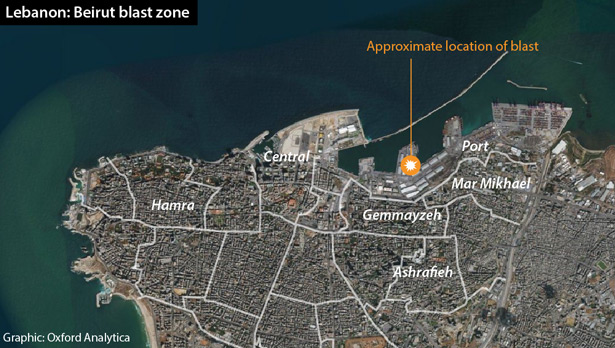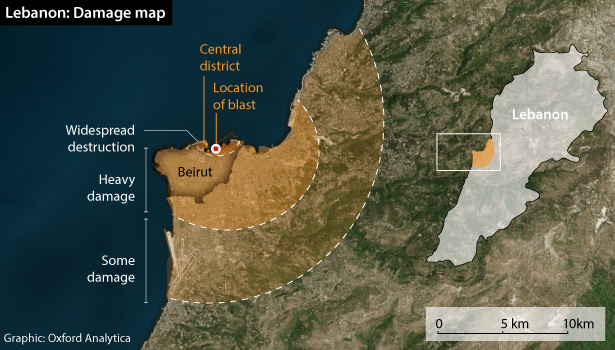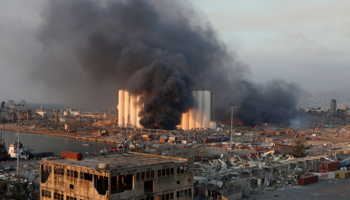Beirut blast could bring hunger, disease and fury
An explosion apparently involving ammonium nitrate stored at Beirut's port was felt as far away as Cyprus
A huge conflagration at Beirut port yesterday killed scores and injured thousands. The leading theory suggests an accidental cause. The blast has caused massive devastation and put extreme pressure on struggling healthcare facilities. Lebanon was already facing a deep economic and political crisis.
What next
The destruction of grain stores and port infrastructure raise the risks of bread and wider food shortages. Difficulties bringing in fuel and other inputs will also exacerbate power failures and undermine reconstruction efforts. The government will scapegoat customs officials for carelessness that allowed the explosion, but rising public anger could target the entire ruling establishment. Violence and looting are possible as hunger and suffering increase.
Subsidiary Impacts
- An influx of emergency aid could potentially help stabilise the exchange rate.
- Limited access to bank accounts will hamper people’s efforts to rebuild.
- A major new spike in COVID-19 cases is highly probable.
Analysis
A fire followed by a massive explosion in Beirut port yesterday destroyed a large area of the capital. At least 100 people have been killed and 4,000 injured, with many still missing and numbers expected to rise. The blast left a crater 75 metres across and destroyed buildings nearby as well as shattering windows and causing damage across the city.
In a city accustomed to explosions, this is far larger than anyone can remember. It revived past traumas and prompted immediate speculation about its cause.
The main emerging explanation is that it was an avoidable accident in which a fire at a warehouse ignited a store of ammonium nitrate constituting at least part of the 2,750-tonne cargo confiscated from a ship in 2013. The cause of the fire is unknown, though there are references to welding work on the warehouse.
Conspiracy theories
This has not stopped the emergence of conspiracy theories.
Observers immediately noted that the incident came three days before a verdict by the UN tribunal investigating the 2005 killing of former Prime Minister Rafiq al-Hariri by a large truck bomb. Since operatives of Shia political-military movement Hezbollah, a key backer of the current government, are widely blamed for Hariri's killing, this is a volatile moment.
By contrast, Hezbollah-linked outlets immediately pointed the finger at Israel, reporting low-flying jets shortly before the explosion. Israel bombed the port during the 2006 war.
Tensions have been rising sharply, with clashes on the border in recent days. Israeli sources rejected any security dimension to the blast as well as suggestions that there was a Hezbollah weapons store in the area that might have exploded (see LEBANON: Hezbollah will avoid Israel escalation - October 16, 2019).
Trump's insistence it was an attack gained little traction
Social media are still spreading disinformation, including a story that the Israeli premier claimed responsibility, or that the mushroom cloud could only have been caused by a nuclear weapon.
US President Donald Trump called it "a terrible attack", citing "some of our great generals", but other US official sources quietly contradicted this.
Existing crisis context
The incident comes at the worst possible time for Lebanon, in the throes of a deep economic and political crisis (see LEBANON: Protest leaders will struggle for control - June 29, 2020).
A government debt default has resulted in informal capital controls, shortages of US dollars and rapid currency depreciation, to LBP8,050 to the dollar yesterday, compared with the LBP1,507.5 official peg.
The result has been repeated power cuts, shortages of fuel for generators and spiralling inflation. International aid is blocked as talks with the IMF flounder over the government's failure to reform (see LEBANON: Beirut will ultimately need IMF support - March 25, 2020).
The impact of COVID-19 and policy responses exacerbated the situation. Following the lockdown easing, infections began rising again: the 177 new cases yesterday raised the total above 5,000. Cash-strapped hospitals warned of an imminent capacity crisis.
Just before the explosion, the interior ministry announced a new, strict five-day lockdown and curfew, due to begin tomorrow.
Health impacts
Injured people are now flooding into hospitals, with some treated in car parks or turned away altogether. The capacity problem has become acute. Medical supplies were reportedly destroyed in the explosion.
There are also ongoing health risks from toxic gases spread by the explosion.
A new lockdown is likely to prove impossible in Beirut. Many people are now homeless or are queueing to give blood, need to repair their homes, are travelling to assist relatives or planning to leave the city altogether.
A large rise in COVID-19 cases is likely as healthcare and test-and-trace responses come under extreme pressure.
Food shortages
The health risks will be intensified by the scale of the looming economic crisis.
The most immediate risks relate to food availability. Lebanon is at least 80% dependent on wheat imports, almost all of which come through Beirut port.
The warehouse that exploded is adjacent to massive grain silos containing most of the country's supply, which were destroyed. Images show unusable grain spilling out across the blast site.
The port's destruction threatens aid and reconstruction efforts
Dollar shortages were already threatening future food imports. Now, even if massive aid is offered, there are additional challenges because of the devastation of the port.
Infrastructure problems
The port is likely to be closed for some time. Tripoli's port facilities to the north lack the capacity to fill the gap.
This will affect not just food imports but also fuel supplies, which were already running short due to lack of foreign currency. Compounded by infrastructure damage from the blast, power cuts and generator failures will become a greater problem, causing suffering and depressing economic activity beyond Beirut while the humid summer heat continues.
Telecommunications infrastructure has also suffered, restricting (already poor) internet access.
All these factors will hamper reconstruction, which might otherwise have provided an economic boost for contractors and builders. To take one example, importing glass to mend broken windows across the city will be complicated by the lack of import infrastructure and foreign currency.
Foreign exchange
Since the recent reopening of Beirut airport, there have been hopes of a modest tourism revival -- at least involving Lebanese expatriates -- to bring in dollars. This is now highly unlikely.
A possible alternative could be an influx of emergency aid, as promises of assistance flood in from across the world. Donors previously reluctant to help because of the country's bankruptcy and endemic corruption are likely to respond to the emergency.
Aid volumes are unlikely to meet requirements, especially given port logistics. However, a large enough aid effort could at least help stabilise the exchange rate.
Political stability
Much will depend on the elites' ability to maintain political stability.
If conspiracy theories gain further credence, they could contribute to civil strife, potentially reviving Sunni-Shia clashes seen earlier this year. If accident is accepted as the explanation, destabilisation may stem from anger at a bureaucratic elite that left explosive chemicals inadequately secured for more than six years.
This timeframe indicts both the current and previous administration. It also plays into broader complaints about government failures on rubbish collection, electricity provision and banking sector collapse.
Prime Minister Hassan Diab has promised "accountability", but it seems increasingly likely the public will apportion blame to the entire ruling establishment, as reflected in a top-trending social media hashtag, "mount the gallows".
Although this anger could provide an opening for genuine political change, it currently seems likelier to add to the rising chaos. Widespread suffering and hunger may spark violent protests and looting, especially given the damage to shops and homes.


